I think this has been the greatest movie year of my lifetime. I still have a long list of films I want to see before New Year’s Day, but so far the pattern has been: go to a movie, be astonished by it, worry that people are going to think I’m a shill because all my reviews are positive. (I promise you, if I think a film is crap I’ll tell you to save your precious money and far more precious time.) But now here we are, today, with me saying that Godzilla Minus One is one of the best movies of the year.
YES, this year, with all those other extraordinary movies in it.
I’ll admit that I never expected to cry during a Godzilla movie. (A Mothra movie, sure—I love Mothra, and some bastard’s always trying to hurt her.) But I also never expected to see a Godzilla movie where a shellshocked protagonist wails that maybe he isn’t even alive—maybe he died in the war, and the life he’s lived since is the last dream of a man rotting in the dirt. A Godzilla movie where honest engagement with PTSD is balanced perfectly with some of the most terrifying kaiju attacks I’ve ever seen.
This movie is so good I can’t believe it.
[Mild spoilers ahead.]
Godzilla Minus One takes Godzilla seriously. Godzilla is myth, metaphor, eldritch horror, divine judgement, and bureaucratic tragedy. He can be climate collapse, or the Bomb, or Terrorism, or War Itself, or Death Itself—but he’s also, always, an unknowable living being who wants to crush the life out of everything in his path.
Godzilla Minus One begins in what people would poetically call “the waning days of World War II”. Which means that Japan is barely standing, the country is ravaged by bombings and fires, the government still won’t admit that the tide has turned, and every adult watching the movie presumably knows what’s coming to end everything. The movie doesn’t show us that, instead allowing Godzilla to stand in for the horror of nuclear holocaust.
Writer and director Takashi Yamazaki drops us straight into the film’s action. It’s 1945, and Kōichi Shikishima (Ryunosuke Kamiki) is meant to be on a kamikaze mission. He deserts his mission, but soon it doesn’t matter, because the base he lands at, claiming a plane malfunction, is attacked by a creature the locals call Godzilla.
Even in this initial encounter, Godzilla is impossibly huge and mind-breaking—any sense of reality you have shatters when you see him.
Having shown us the monster, the film takes an unexpected turn and becomes a post-war domestic drama. Having failed to die like he was supposed to, Kōichi has to figure out how to live. He returns to a home that was destroyed in the Bombing of Tokyo. His parents both died, there’s no money or food, and his neighbor Sumiko (Sakura Ando) is disgusted by his dereliction of duty. Then he meets Noriko (Minami Hamabe). Her parents also died, but as she was fleeing the fire that killed them, a dying woman handed her an infant. Now this woman, barely clear of childhood herself and grieving her own family, has to keep both of them fed. She and Kōichi orm a makeshift alliance. They scrounge for food and look after the baby, Akiko, together, never daring to think of themselves as a real family, but acting like one all the same. They begin to try to live.
And then Godzilla returns.
You know that scene that comes in every Godzilla movie, where the poor beleaguered extras flee screaming from a guy in a rubber suit? And everyone has to kind of buy into it, like an old episode of Doctor Who?
Here that scene is turned on its head. It begins with a character we’ve come to know commuting to work by train. She hears an ominous rumbling, she looks out, and there’s Godzilla. And she says, “Is that… Godzilla?”
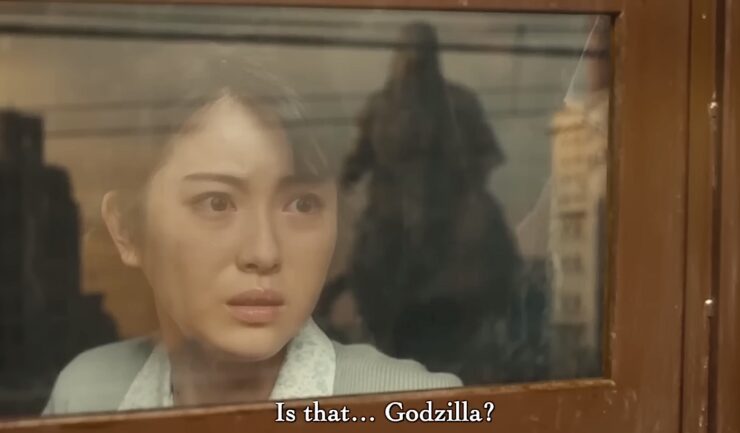
And on its surface, this is hilarious.
YES it’s Godzilla, we think. Who the hell else could it be???
But see, she doesn’t know. She only heard about Godzilla a few days ago, as a folktale told by people on a small island off the coast that she’s never even visited, who turned out to be real.
Even while she believed the person who told her, she couldn’t really believe it believe it. Because Godzilla’s absurd. As absurd as the idea that humans have created a weapon that can destroy all life on earth. As absurd as letting bombs rain down on the innocent. As absurd as the idea that we’ve ignored clear signs of our collapsing climate long past the point where it will mean the death of our species. As absurd as the fact that all of us die, even me. And now here he is, this impossible monster, and we’re watching a character we’ve come to care about, whose life and history and dreams we know, commuting to her job and realizing that today might be the day she dies. That scene we’ve seen in every Godzilla movie isn’t funny this time.
The film also gives us the usual scene where a scientist makes an absurd plan to defeat the monster—but he’s delivering his plan to a room full of exhausted army veterans, every one of them suffering from PTSD, everyone knowing that, having just come home to a bombed-out, defeated city, having just begun to pick their lives up and reunite with their families, they have to go back onto a navy cruiser and fight an impossible enemy. There are moments when people help each other up, and others when crowds trample the overwhelmed. There are scenes when people drop to the ground and start screaming, the way you would if an impossibly huge monster showed up in your town.
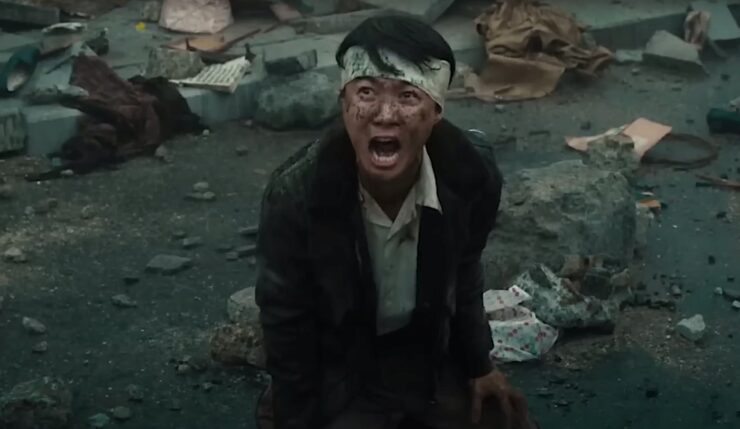
The acting is excellent across the board (like I said, you have to commit if this premise is going to work, and everyone in this film is all in.) The CGI and effects would be great in any year—but especially after watching multiple lackluster Marvel movies that were made for many times Godzilla’s budget, seeing an action movie that builds tension through blocking and choreography, with CGI that looks absolutely tactile, was a welcome relief. When Godzilla stomps through town, you feel the ground shake. When he roars, you want to cover your ears. Director Yamazaki got his start in visual effects, and was the VFX supervisor here, and you can see the care that’s been taken with bringing Godzilla to life.
About the kaiju in the room: as much as Godzilla can be a metaphor for many things, here he is also a monster. He was attacking humans even before he was irradiated. He’s not an ally to humanity, he’s not here to save people from Hedorah or Mechagodzilla. He’s a relentless beast who can’t be reasoned with, and seemingly can’t be killed.
Over the course of two hours and five minutes (that felt like half that) Godzilla Minus One nods to its own franchise, the work of Yasujirō Ozu, Grave of the Fireflies, Dunkirk, Mononoke Hime, and, in what I think was my favorite sequence, Jaws.
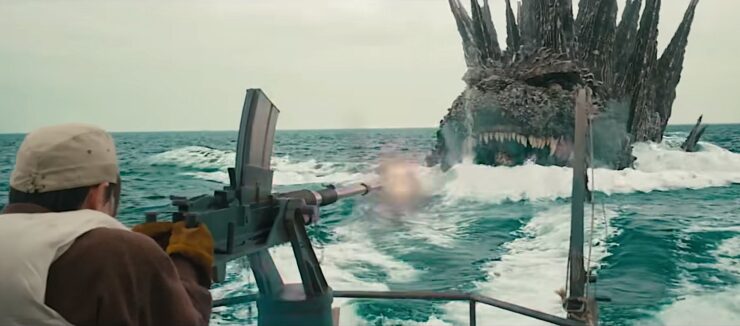
This is what I love. When people come into a series like this and take it seriously. When they look at how Godzilla started, and why it started, and think seriously about how to update that story. It becomes a story of nuclear proliferation, about the trauma of a nation in tatters, about governments that use their citizens as cannon- and kamikaze fodder. A generation that sells its children. And, look, I’ve been dancing around the thing I really want to say because I’m worried it will sound flippant, or even offensive, but here goes: what I kept thinking about was Oppenheimer.
I’ve seen Oppenheimer three times, on three different screens. I’ll probably see it again, and I’d also like to see Godzilla Minus One on the big screen again. It’s easy to say “this film is about survivor’s guilt”, “this movie is about PTSD”, “this movie is about the horror of war”. Both of these films force their viewers to experience that horror in the context of a genre movie, a blockbuster—one a Kaiju Movie, and one a Great Man Biopic. And in both cases, they subvert their genres. Oppenheimer asks what happens when a movie uses all the its genre cues to tell us we’re watching a Great Man, right up until the moment that man does one of the worst things anyone has ever done. Godzilla Minus One uses the tropes of a kaiju movie, already rooted in a discussion of nuclear war, and twists it to explore survivor’s guilt—and then to take it a step further to look at what happens when the survivors face death again.
Along the way, both films use their genre to help their audience understand a fact that is too large for the human mind to hold: by inventing the atomic bomb, and allowing nuclear war to be a possibility, we might have doomed ourselves. We’ve probably doomed ourselves. For the rest of humanity’s existence, it will have to contend with what happened at the end of World War II. It will have to do that because politicians and bureaucrats made some disastrous decisions, and left the rest of us to live with them.
One of the reasons this movie made me cry—a thing that does not usually happen—is that, in contrast to Oppenheimer, it chooses hope in the face of despair. Maybe that makes it a lesser film in a way, but I would like to think not. I would like to think that watching people pull together to choose life in the face of death can also make for a genre-defining masterpiece.
Leah Schnelbach is still reeling. DO MOTHRA NEXT. Come bug them on the thing that used to be Twitter or Blue Sky or whatever.










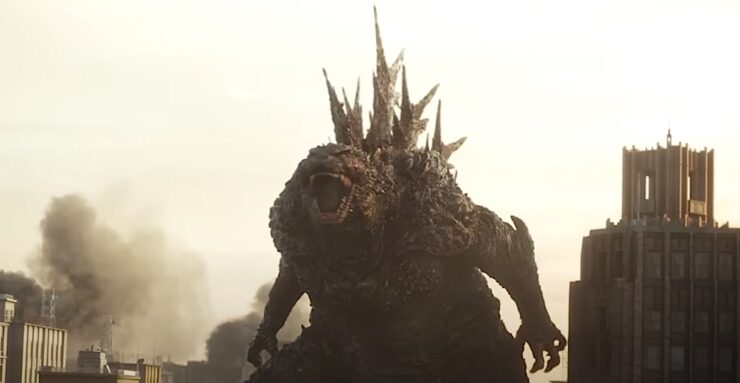
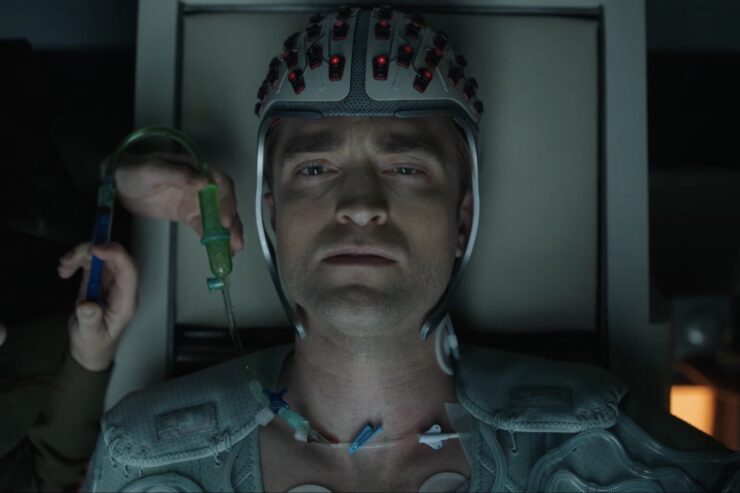
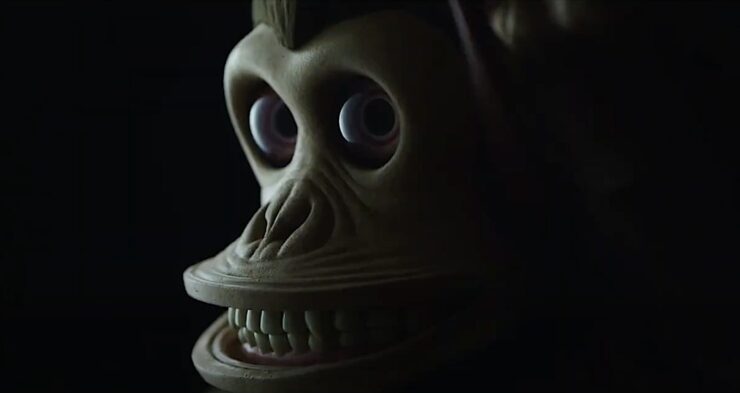
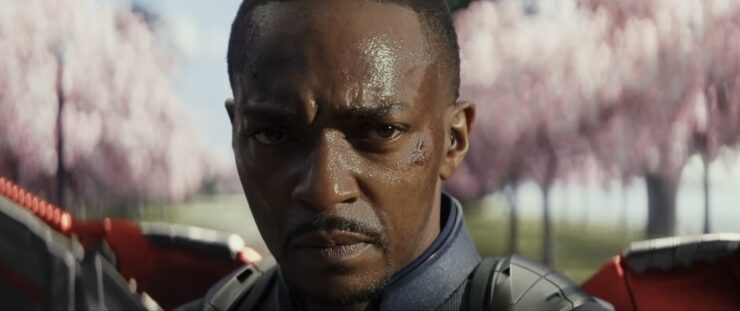
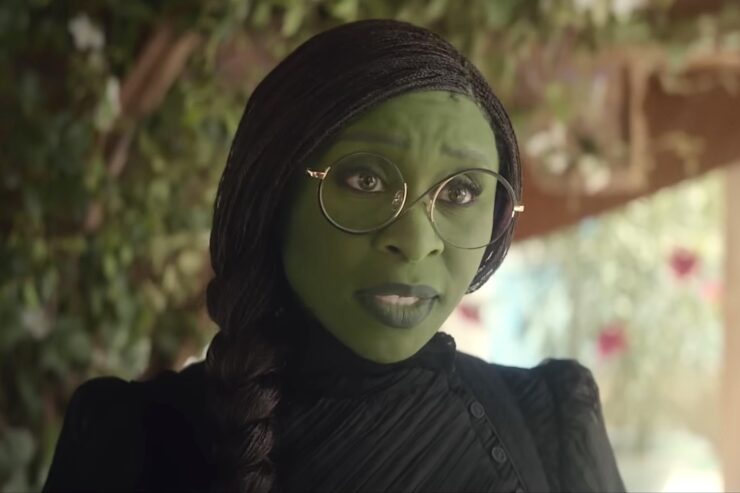
I loved this movie a lot. That Godzilla was tormented as well by things not understood. Every time a ship or train went flying though the air, there was the greater unreality. Things humans made were not meant to do that. And then Godzilla. We sympathize with Godzilla in earlier incarnations because it is fighting greater enemies, greater threats. This is the first time I sympathized with Godzilla because it was in as much pain as its victims. Mindless, destructive, driven, and not seeing or caring what it does.
I agree with the acting being the best I have seen in a Godzilla movie, The moment when veterans said, they cannot do what was asked it and they must leave, and they were not accosted or judged by those that remained, was perhaps the most powerful moment for me. Choosing hope does not make one less, it is maybe one of the hardest things to do when everything is on the line. The mechanic said it best, I’m on your side, we need more like you, to decide in the face of despair to go against the order to die and live.
I was planning on ignoring it. You talked me into seeing it.
my wife and i saw it today and, while i was caught up with the excellent blending of history and commentary, she just flatout loved it. so did i. i’ve always said a godzilla movie is like porn- you’re not there for the plot- but this a Shin Godzilla excel on all accounts.
I’m not sure how much Godzilla Minus One chooses hope. Hope that people can try to live the movie definitely leans into. But there are the last two shots, both the expected stinger and Noriko’s neck. Both seem to be leaning on that even if you decide to live that doesn’t mean you will. Which might be an honest kind of hope, but doesn’t feel very hopeful from the outside.
That said there is certainly a line of hope in watching a society conditioned to accept death start to embrace the idea of survival.
It would be interesting to do a follow-up with Godzilla survivors being analogs to Hiroshima survivors and/or thematically linking kaiju to cancer.
tarbis @@@@@ 4: I hear what you are saying about hope not looking very hopeful from the outside, but that is the choice we always have, no matter what we choose, we will still have things happen to us and we will still die. That’s why I feel choosing hope is tragically heroic. Also why I think I resonated with this movie and living in the moment of making choices.
And I am right with you with the theme of cancer, it was my very first thought in watching how Godzilla progressed through the movie. I even have a theory that is why Godzilla seems to have a small head in relation to the body. Whatever is mutating Godzilla doesn’t need a brain, just a massive body incubating the nuclear fire.
My husband and I adored it. His comment that the villain in Shin Godzilla was bureaucracy and the villain in this one is crippling guilt is an oversimplification but not entirely wrong.
This is a profoundly anti-government and anti-war movie. The minesweeper boat basically gets sent out to stall while the bigger ship is on the way, with no expectation that they will survive. The government is useless, the Americans are off dealing with the Russians, and nobody’s going to help if we don’t do it ourselves. The best they can manage is to get a bunch of exhausted Navy veterans with four partially decommissioned destroyers, and everyone goes on the ships with a full expectation that they may not make it back, but they’re all they’ve got. (I generally figured out the beats ahead of time, but was not expecting the rag tag backup fleet)
I love the fact that in most of the first half of the movie, Godzilla is seen from a human eye viewpoint, not the detached distant one often seen in older films. You don’t get a full view of him until you get some guys up on a roof or in a plane. That emphasizes just how much trouble you’re really in and just how small we are by comparison.
I also liked the plot they came up with to try and kill Godzilla. Yes it’s a bit rube goldberg, but they do do an impressive amount of damage. And while this is a biggest baddest Godzilla ever, in many ways he’s also the most vulnerable. You see him take damage. Yes he almost immediately regenerates it, but the scarring remains. That’s not something we’re used to seeing in a Godzilla movie.
Between covid and a back injury, I’m not been to the theater often in the last few years because I have difficulty sitting in a theater seat without my own pillows, but I’m glad I went to this one, even as I sat there at the ending with tears running down my face and soaking my mask.
This is, in my opinion, the best Godzilla film ever. Godzilla feels real and frightening, It’s not a weightless cgi monster slugging another weightless cgi monster. His appearances are terrifying and you can feel the fear of the people fleeing in his path. And for once, I really cared about the human story! I agree, it’s one of the best of the year.
It was an okay film. But I can’t really say I got the big orgasm everyone seems to be having over it.
Overall it was a bit to melodramatic for me to take seriously.
Loved it! First Godzilla film my partner has seen and she loved it too. Have to break it gently that probably no other in the series will quite live up to it. It’s kinda hard to think of this Godzilla and the one shaking hands with Jet Jaguar as in any way related.
I was a little concerned going in that a Japanese film set after the second world war might be a bit politically dodgy as the government still tries to downplay crimes committed and glorify a military which had become little more than a death cult. I was so surprised to see open condemnation of the wartime government and military and their disregard for human life. I loved the quote along the lines of ‘Never having gone to war is something to be proud of!’
A theme of a group of people choosing to live when they have always been told they should die is a beautiful thing.
I wander if the film will be viewed with any controversy in Japan for these reasons?
Thought it was fantastic. It takes the threat of Godzilla and ties in neatly into the redemption arc for the main character – although is it the kind of redemption where society catches up with his original standpoint, rather than him atoning for his societally perceived sins and is about rejecting that. It’s interesting that there are several points where a character says the nation never changes, and yet we see that the people do.
Oddly this was possibly one of the few Godzilla films where I didn’t really feel a great deal of sympathy to the monster.
I did have a slight misgiving over Noriko’s fate but it is quite satisfying.
@9 Agreed on there nothing that stands on quite the same plane. Shin Godzilla is near but fails to give us quite so compelling a set of protagonists, but after that as enjoyable as the other films are, none of them are quite on the same level in terms of writing.